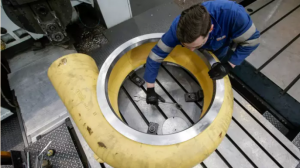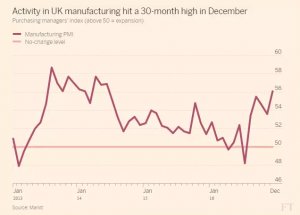PMI survey shows fastest growth for 2½ years

Activity in the UK’s manufacturing sector grew at the fastest pace for two and a half years in December as the weaker pound helped to increase exports, figures released on Tuesday showed.
The Markit/CIPS survey rose to 56.1 in December, higher than had been expected by economists and up from a revised 53.6 in November. Anything above 50 indicates expansion, anything below contraction.
During the past year the pound has fallen 17 per cent against the US dollar and is down 14 per cent against the euro. That has lifted demand at UK factories from domestic and overseas clients.
Purchasing managers reported the first increase in their backlog of work since February 2014 owing to the volume of new business and said they had seen more orders from the US, Europe, China and India.
“The UK manufacturing sector starts 2017 on a strong footing,” said Rob Dobson, a senior economist at IHS Markit. “The survey is signalling a quarterly pace of growth approaching 1.5 per cent, a surprisingly robust pace given the lacklustre start to the year and the uncertainty surrounding the EU referendum.”
Weir, the UK-listed engineering group, recently told the Financial Times that it was examining whether to move production of some of its industrial equipment to the UK from overseas to benefit from the weaker pound. The FTSE 250 company supplies pumps and valves to the mining and oil and gas sectors.
“We believe recent sterling depreciation is currently giving a competitive edge to the products we manufacture in the UK and sell overseas,” it said. “However, the cost of imported raw materials such as metal and rubber has also risen and these offset some of those benefits.”
Paul Everitt, chief executive of the aerospace trade organisation ADS, said UK industry had benefited from the fluctuations in exchange rates but added these advantages “are anticipated to lead to an increase in input costs later this year”.

Although this eased slightly from October’s highs in December, rates of inflation remained at the highest level in the survey’s history. The main driver of higher prices was the depreciation in the pound since the referendum — 75 per cent of businesses made reference to the exchange rate — but others mentioned rising oil and steel costs.
December’s unexpectedly high reading is the fifth consecutive month of expansion since a sharp decline in July, the month after the EU referendum.
While Britain’s economy has performed better than had been expected in the wake of the vote, many economists remain pessimistic about the prospects for growth once higher inflation begins to cut the real value of incomes, which could reduce spending.
Previous surveys of purchasing managers have found that companies are experiencing increased pressure on pricing.
Sentiment towards the FTSE 100 has brightened on optimism over bank earnings as bond yields rise, and on the support that a stronger oil price is giving the commodities sector.
December’s PMI survey diverges from other measures: the latest industrial production figures from the Office for National Statistics found that manufacturing unexpectedly fell 1.3 per cent in October compared with the previous month.
Samuel Tombs, chief UK economist with Pantheon Macroeconomics, said: “The relationship between the PMI and the official data, however, has been particularly loose lately; the PMI has signalled steady growth in manufacturing output since August, but the official data have oscillated around a flat trend.”
Other figures from the ONS found the UK’s trade deficit narrowed by the most since records began during October, although the ONS was reluctant to draw any conclusion on the impact of the fall in the pound and said it would want to see a few more months of data.
Sterling’s fall since the UK voted for Brexit in June has also underpinned a rally in equities. The FTSE 100, which includes many companies with significant overseas incomes, hit a fresh record high on Tuesday and is up 15 per cent during the past 12 months.
Separate survey data published on Wednesday from businesses in north-east England gives signs that a slowdown might be ahead.
The latest quarterly economic survey by the region’s Chamber of Commerce found that in the last three months of 2016 most main indicators have fallen compared with the previous quarter, including UK sales and orders, which fell to their lowest level for four years.
The score for export sales overall turned negative for the first time in six years, but manufacturing export sales recovered, possibly, says the report, because of the fall in the value of the pound.
The findings, based on feedback from 205 north-east companies in October/November 2016, show plant investment plans beginning to recover after flatlining following the referendum in June. Respondents’ biggest concerns are exchange rates — cited by 80 per cent of manufacturers — and inflation.